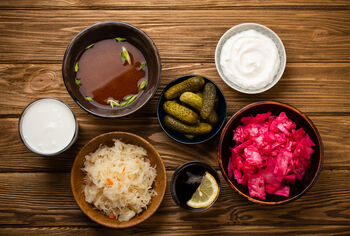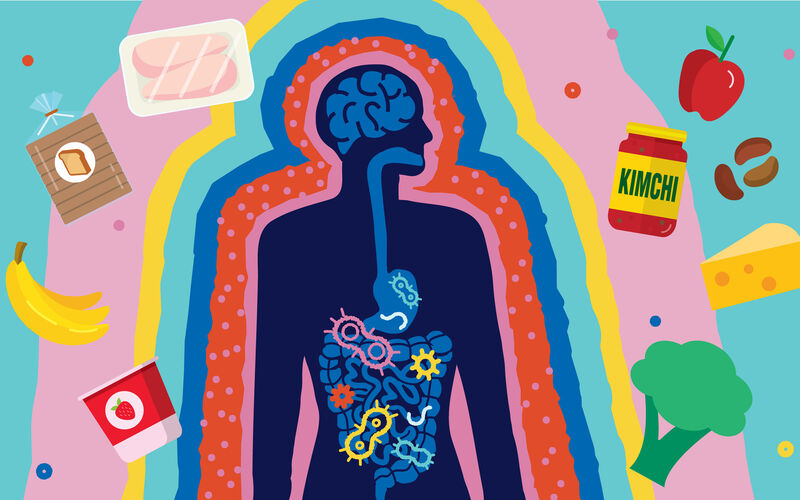What You Need To Know for a Happier Gut
Gut health is a hot topic, but with terms like prebiotics, probiotics and now postbiotics, it’s easy to feel overwhelmed. Think of your gut as a busy ecosystem, and these play different but connected roles in keeping it balanced.
What Are They?

Choosing fiber-rich and fermented whole foods gives you the ideal mix of prebiotic, probiotic and postbiotic benefits, says researcher and registered dietitian Nagi Kumar, PhD.
Your gut is home to trillions of microorganisms, known as the gut microbiota, and they do much more than help with digestion. They’re involved in absorbing nutrients, regulating immunity and even deactivating cancer-causing compounds, said Nagi Kumar, PhD, researcher and registered dietitian at Moffitt Cancer Center.
- Prebiotics are complex sugars that are known to ferment and stimulate the growth of useful bacteria while suppressing the growth and activity of harmful organisms already in your gut.
- Probiotics are a combination of live bacteria that are critical to maintaining good health when consumed in adequate amounts.
- Postbiotics are byproducts that are created by the other bacteria in the gut that may be important for your health.
Food First, Always
The best way to support your gut microbiota is through the food you eat. Kumar recommends reaching for everyday staples such as:
- Prebiotics: found in beans, lentils, garlic, onions, bananas, whole grains and nuts
- Probiotics: present in fermented foods like yogurt with live cultures, sauerkraut, kimchi, buttermilk, kefir, miso and tempeh
- Postbiotics: similar to probiotics and are produced after eating yogurt, kefir, sauerkraut, kimchi, kombucha, tempeh and miso
 “Daily changes in diet, like fiber or fat intake, can influence which microbes flourish in your gut,” Kumar said. “Choosing plant-based meals rich in legumes, fermented dairy and vegetables can help the colonies of beneficial bacteria grow.”
“Daily changes in diet, like fiber or fat intake, can influence which microbes flourish in your gut,” Kumar said. “Choosing plant-based meals rich in legumes, fermented dairy and vegetables can help the colonies of beneficial bacteria grow.”
She added that prebiotics have been shown to improve the effects of several chemotherapeutic agents as well as radiotherapy in animal studies, although human studies are still in progress.
“Postbiotics is a rapidly evolving area,” Kumar said. “These aren’t live bacteria. They are metabolites created by probiotics that may improve immune function and reduce inflammation. Since they don’t involve live cultures, they might even carry fewer side effects.”
Although early research in animals and small human studies suggests promise, scientists are still working to understand their full potential.
Do Supplements Help?
 Even with probiotic supplement sales projected to top $12.8 billion by 2026, Kumar urges caution. Commercially available supplements are not evaluated by the U.S. Food and Drug Administration, and their ingredients may not match what’s on the label.
Even with probiotic supplement sales projected to top $12.8 billion by 2026, Kumar urges caution. Commercially available supplements are not evaluated by the U.S. Food and Drug Administration, and their ingredients may not match what’s on the label.
“There’s a lack of human research showing how well probiotic supplements are absorbed and used in the body,” she said. “Until we know more, food sources are the most reliable way to get these nutrients.”
She added that supplements might help after a course of antibiotics or for those with digestive issues or limited diets. But they shouldn’t be your go-to solution. It’s best to check with your doctor or dietitian first.
Gut Health at a Glance
- Prebiotics may boost regularity, improve mineral absorption and strengthen immunity.
- Probiotics may aid digestion, restore microbial balance and support the immune system.
- Postbiotics may help reduce inflammation and support immune function, but research is still evolving.
The Bottom Line
Your gut doesn’t need a trendy fix; it just needs real food. Choosing fiber-rich ingredients and fermented options gives you the ideal mix of prebiotic, probiotic and postbiotic benefits. Save supplements for when your health care provider recommends them. Your gut and your wallet will be grateful.




